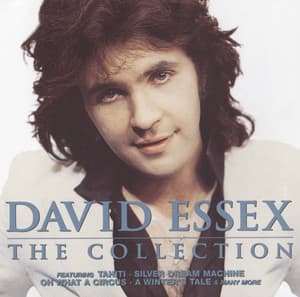
A QUIET REFUGE IN THE MIDST OF STARDOM
From the very first breath of Cool Out Tonight, one senses a moment of gentle reckoning—a star‑turning inward, the thrum of 1970s pop‑rock giving way to the hush of self‑reflection. Released in 1977 by David Essex, the single climbed to No. 23 on the UK singles chart. It appears on his album Gold & Ivory from the same year—an album that itself peaked at No. 29 on the UK Albums Chart. In the context of Essex’s career, this track embodies a moment of transition: from the glam‑pop and teen‑idol sheen of his earlier hits to a deeper, more contemplative mood.
In introducing this piece, “The Vinyl Archivist” invites you to pause—turn down the volume on the flash and spectacle of celebrity and listen to the understated emotional core of this song.
At the height of his success, Essex was already a familiar face not just in record shops but in cinema screens and television studios. Yet “Cool Out Tonight” captures a rare vulnerability: the refusal to chase the next big moment, the decision instead to stay, to breathe, to be. There is scant evidence of a dramatic legend behind the song’s creation: no out‑of‑control sessions, no famously tortured lyrics. Instead, Essex turns the spotlight gently inward. He seems to address someone close, proposes postponing the go‑out‑tonight, saying: let’s pause, let’s retreat, let’s rediscover something quieter. That shift carries more weight precisely because it is subtle.
Musically, the track is anchored in a mellow groove. Unlike some of his more flamboyant pieces, this one doesn’t grandstand; it sighs. The instrumentation allows space for the voice to linger—Essex’s familiar baritone navigates between longing and comfort, confident yet unassuming. The melody lingers in the half‑light, and the production scratches at the edges of introspection rather than broadcasting a full midday shine. In so doing, the song reveals itself to be less about the outward spectacle of romance and more about the private geography of contentment.
Lyrically, “Cool Out Tonight” resignifies an ordinary evening in the life of a pop star. The implied circumstances—maybe invitations to go out, glitter and clinking glasses, the restless pull of the social scene—are shadowed by a simpler impulse: “Stay with me here.” That insistence becomes the emotional pivot. What the narrator gives up—a glamorous night out—is precisely what he gains: a moment of stillness with someone who matters. It is the moment when what once felt essential—being seen, being on, being brilliant—softens into what is truly meaningful: being present, being together.
In the backdrop of 1977 Britain, as music, culture and society were hurtling toward punk and post‑punk, this song offers a counterpoint: not rebellion in the form of noise, but rebellion in the form of withdrawal. Not a cry, but a calm exhale. It reflects an artist who is comfortable enough in his success to step away from it, to choose the couch over the spotlight. The narrative becomes one of self‑possession as much as love: the narrator knows what the world expects, but he says, “Not tonight. Here with you is my world.”
Over decades, “Cool Out Tonight” has settled into a quieter corner of Essex’s canon—never the chart‑topping blockbuster, but a necessary turning point. Its place at No. 23 ensures it is part of his Top 40 legacy—but its real achievement lies in re‑defining what a single could mean: less flash, more undercurrent; less spectacle, more soul. For longtime fans and newcomers alike, it is that track you spin when the parties have ended and the dawn begins to whisper. Because in that hush, you hear the real heart of the performer.